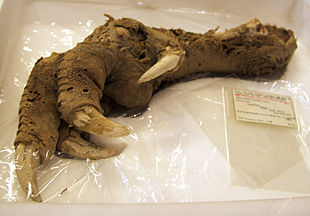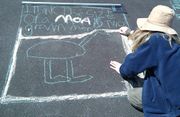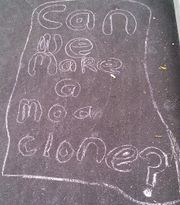Warrington School/Curriculum Planning/Room 1 Planning Term 1
From WikiEducator
Contents
- 1 Term 1 MrP Topics
- 1.1 Aims:
- 1.1.1 Science:Archaeology
- 1.1.2 Writing:Moa, Mihi and Archaeology
- 1.1.3 Maths - Problem Solving
- 1.1.4 Visual language - Mihi
- 1.1.5 Dance - Life of a moa
- 1.1.6 Reading
- 1.1.7 Oral language
- 1.1.8 Music
- 1.1.9 Health
- 1.1.10 Maori - Archeology and Moa related
- 1.1.11 Computer Science - Audacity
- 1.1.12 Key Competency - Relating to others
- 1.1 Aims:
Term 1 MrP Topics
Aims:
- To explore the world of archeology, Moas and creative writing
- To assist students in becoming independent learners
- To use the Inquiry Model of learning
Open Democratic Education, Archeology, Moas, Wawa Challenge, Sutton Camp, BBFMLinks
- NZ Science Hub
- Encyclopedia of NZ - Moa
- Short Story of the Moa
- Long Story of the Moa
- Te Papa Moa - bones
- Moa Hunt
- KCC - Moa
- Wikipedia Moa
- NZ Birds
- Insects Meet Humans - dance
Science:Archaeology
Nature of Science
Students will learn to:
- Appreciate that science is a way of explaining the world and that science knowledge changes over time
- Identify ways in which scientists work together and provide evidence to support their ideas
- Develop skills and understandings of scientific methods of archaeology including enquiry, questioning, observation, information gathering, interpretation and reporting
- Explore and understand the local environment - archaeological test pits
- Utilise people with specialised local knowledge - visiting archaeologist
- Know about and use scientific tools and apparatus safely and appropriately - at times working in the field in groups with equipment
Writing:Moa, Mihi and Archaeology
Opportunities to:
- Writing related to the topics
- Create word banks
- Re-assemble word bank into appropriate responses
- Practice handwriting and font styles
- Proof read and edit - digital or hand-written
- View and share
Maths - Problem Solving
- Working on contextual problems around measuring - eco-hut, archeology
- Explain workings
- Create own word problems for others
- Explain workings
Visual language - Mihi
- Effectively arrange, present and display visual and written information
- Create an A3 mihi poster
- Viewing - interpret visual information from a wide range formats and styles
- Read, analyse, understand and think about messages and purposes of information presented
- Use of fonts, colour and images that give details about self
Dance - Life of a moa
Children will learn to:
- Enjoy and participate in a range of dance activities
- Recognise and know about and follow some of the elements of dance (eg body, space, time, energy and relationships).
- Express themselves through dance and feel comfortable performing both alone or in a group.
- Participate in a class dance demonstrating knowledge of the moa
- Recreate a dance in the style of the insect meets human vimeo
- Incorporate movement that tells a story in time with the music
- Perform as a class group
- Incorporate movement that tells a story in time with the music
Reading
- Topics - Moas
- Internet/books on own or in group
- At school at home
- Internet/books on own or in group
- School journals
- Read and write questions
Oral language
- Investigate features of Audacity software - Audacity Tutorial
- Read and perform creative response from above - record - self evaluate
- Extension - blog or document
- Read and perform creative response from above - record - self evaluate
- Investigate features of Audacity software - Audacity Tutorial
Music
- Kiwi kid songs
- One World and Blue Smoke
- Ukelele
- One World and Blue Smoke
Health
- Life Education Trust visit - focus on friends
- Develop confidence in a range of physical skills e.g. ball handling - padder tennis, cricket, aquatics and dance
- Utilise local expertise and resources to increase understanding
- and share our knowledge
- English, Te Reo, Legends...
- Pictures, photographs, objects - artefacts
- English, Te Reo, Legends...
- and share our knowledge
Computer Science - Audacity
- Record a radio advert
- Work along-side others to learn use the audacity application
- Aiming for layers of Creative Commons audio tracks and over-all quality
- Save projects onto desktop, export once finished
- Aiming for layers of Creative Commons audio tracks and over-all quality
- Work along-side others to learn use the audacity application
Key Competency - Relating to others
- Interacting effectively with a diverse range of people in a variety of contexts
- The ability to listen actively, recognise different points of view, negotiate, and share ideas
- Relating well to others are is being open to new learning and able to take different roles in different situations
- Aware of how their words and actions affect others
- Know when it is appropriate to compete and when it is appropriate to co-operate
- Working effectively together, coming up with new approaches, ideas, and ways of thinking


